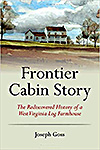Review — FRONTIER CABIN STORY: The Rediscovered History of a West Virginia Log Farmhouse by Joseph Goss (Afghanistan)
 Frontier Cabin Story — The Rediscovered History of a West Virginia Log Farmhouse
Frontier Cabin Story — The Rediscovered History of a West Virginia Log Farmhouse
by Joseph Goss (Afghanistan 1967–69)
Peace Corps Writers
December 2018
208 pages
$14.94 (paperback)
Reviewed by D.W. Jefferson (El Salvador 1974–76; Costa Rica 1976–77)
•
This is the story of a historic log farmhouse located near Shepherdstown, West Virginia which the author and his wife purchased when on the threshold of their retirement. But more than that, it is a valuable case study of how to go about researching the history of an interesting older building, its owners and occupants over the years, and the surrounding area. As the author explains:
I began this project hoping to portray the historical record of one long-overlooked farmhouse and all that I could learn about the people with connections to it. And that is how it has culminated. But I also want it to serve as a useful reference for disciples of local history. I believe the type of research I have done and the results I achieved are unique for such an undocumented place, at least in the Shepherdstown area. It may work too as a prototype for researchers of forgotten archaic homes anywhere. Without a doubt, it shows how much you can find out about even the least-known places if you are willing to search relentlessly.
Examples of Joseph Goss’s relentless searching include finding valuable information on the Library of Congress’s website, and from their Chronicling America Project, which contains digitized archives of two local newspapers which he likely would not have otherwise had access to. A full list of resources appears in the “Acknowledgements,” and certainly will provide ideas to other history researchers.
How does one tell the story of an old house? Rather than combining everything into a single narrative, Mr. Goss divides his findings into distinct subject areas such as: “Wars,” “Farm Landlords,” and “Architectural Diary.” He even includes a chapter discussing what he learned about slavery at the farm that included the house. This approach works well although it does lead to a number of instances in which the author feels compelled to explain to the reader when the narrative contains breaks in chronological order.
The book is well written and very thoroughly researched, including three appendices and an index. I hope that one of Mr. Goss’s future projects will be a historic novel featuring the house as a main character along with a few of the fascinating owners and tenants of the house whose history he has researched here!
•
D.W. Jefferson was a Peace Corps agriculture volunteer in El Salvador (1974-76) and Costa Rica (1976-77). A blog about his Peace Corps years is at dwjefferson.blogspot.com He is currently retired from a career in computer software engineering.
No comments yet.
Add your comment